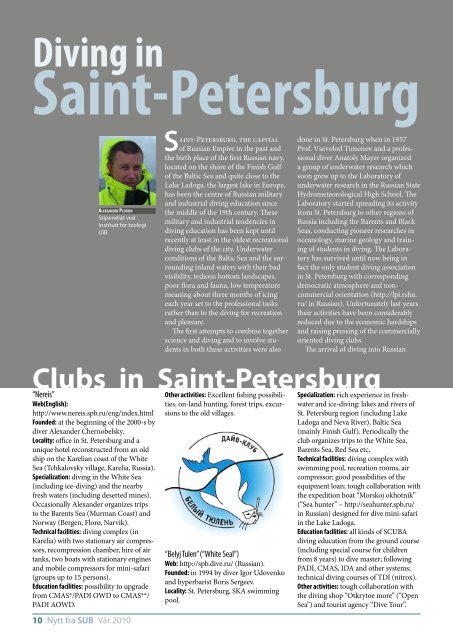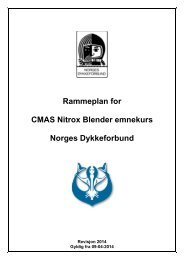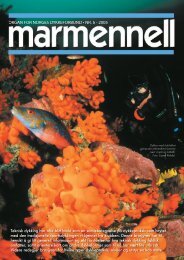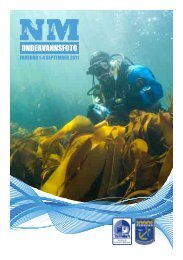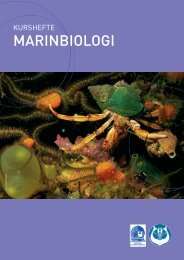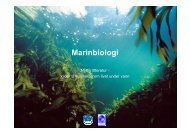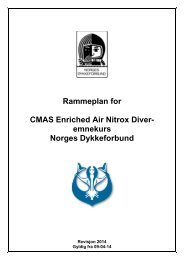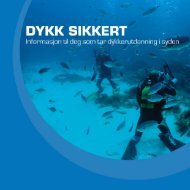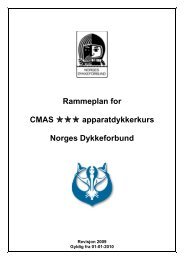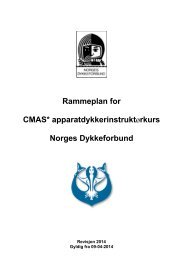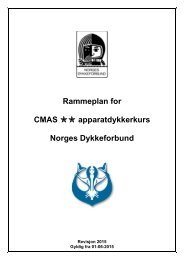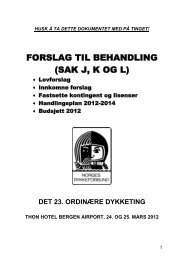Redaktøren
DYKK - Norges Dykkeforbund
DYKK - Norges Dykkeforbund
- No tags were found...
You also want an ePaper? Increase the reach of your titles
YUMPU automatically turns print PDFs into web optimized ePapers that Google loves.
Diving inSaint-PetersburgSaint-Petersburg, the capital done in St. Petersburg when in 1957of Russian Empire in the past and Prof. Vsevolod Timonov and a professionaldiver Anatoly Mayer organizedthe birth place of the first Russian navy,located on the shore of the Finish Gulf a group of underwater research whichof the Baltic Sea and quite close to the soon grew up to the Laboratory ofLake Ladoga, the largest lake in Europe, underwater research in the Russian Statehas been the centre of Russian military Hydrometeorological High School. Theand industrial diving education since Laboratory started spreading its activityAleksander Plotkinthe middle of the 19th century. These from St. Petersburg to other regions ofStipendiat vedmilitary and industrial tendencies in Russia including the Barents and BlackInstitutt for biologiUiBdiving education has been kept until Seas, conducting pioneer researches inrecently at least in the oldest recreational oceanology, marine geology and trainingof students in diving. The Labora-diving clubs of the city. Underwaterconditions of the Baltic Sea and the surroundinginland waters with their bad fact the only student diving associationtory has survived until now being invisibility, tedious bottom landscapes, in St. Petersburg with correspondingpoor flora and fauna, low temperature democratic atmosphere and noncommercialorientation (http://lpi.rshu.meaning about three months of icingeach year set to the professional tasks ru/ in Russian). Unfortunately last yearsrather than to the diving for recreation their activities have been considerablyand pleasure.reduced due to the economic hardshipsThe first attempts to combine together and raising pressing of the commerciallyscience and diving and to involve studentsin both these activities were also The arrival of diving intooriented diving clubs.RussianClubs in Saint-Petersburg“Nereis”Web(English):http://www.nereis.spb.ru/eng/index.htmlFounded: at the beginning of the 2000-s bydiver Alexander Chernobelsky.Locality: office in St. Petersburg and aunique hotel reconstructed from an oldship on the Karelian coast of the WhiteSea (Tchkalovsky village, Karelia, Russia).Specialization: diving in the White Sea(including ice-diving) and the nearbyfresh waters (including deserted mines).Occasionally Alexander organizes tripsto the Barents Sea (Murman Coast) andNorway (Bergen, Florø, Narvik).Technical facilities: diving complex (inKarelia) with two stationary air compressors,recompression chamber, hire of airtanks, two boats with stationary enginesand mobile compressors for mini-safari(groups up to 15 persons).Education facilities: possibility to upgradefrom CMAS*/PADI OWD to CMAS**/PADI AOWD.Other activities: Excellent fishing possibilities,on-land hunting, forest trips, excursionsto the old villages.“Belyj Tulen” (“White Seal”)Web: http://spb.dive.ru/ (Russian).Founded: in 1994 by diver Igor Udovenkoand hyperbarist Boris Sergeev.Locality: St. Petersburg, SKA swimmingpool.Specialization: rich experience in freshwaterand ice-diving: lakes and rivers ofSt. Petersburg region (including LakeLadoga and Neva River), Baltic Sea(mainly Finish Gulf). Periodically theclub organizes trips to the White Sea,Barents Sea, Red Sea etc.Technical facilities: diving complex withswimming pool, recreation rooms, aircompressor; good possibilities of theequipment loan; tough collaboration withthe expedition boat “Morskoj okhotnik”(“Sea hunter” – http://seahunter.spb.ru/in Russian) designed for dive mini-safariin the Lake Ladoga.Education facilities: all kinds of SCUBAdiving education from the ground course(including special course for childrenfrom 8 years) to dive master; followingPADI, CMAS, IDA and other systems;technical diving courses of TDI (nitrox).Other activities: tough collaboration withthe diving shop “Otkrytoe more” (“OpenSea”) and tourist agency “Dive Tour”.marine biology is traditionally associatedwith Prof. Mikhail Propp. Bornand educated in St. Petersburg Prof.Propp leaded a number of underwaterlaboratories from Murmansk at theBarents Sea in 1960-ies to Vladivostokat the Sea of Japan in 1980-ies. But hismost famous diving expeditions werecarried out on the Antarctic coast underthe direction of the Zoological Institute,Russian Academy of Sciences in St.Petersburg. Propp’s traditions are stillalive since in 2007 a new generation ofSt. Petersburg zoologists leaded by Prof.Boris Sirenko organized a diving expeditionon the shore of the CollaborationSea (Indian sector of the Antarctic).Diving in St. Petersburg is also associatedwith underwater archeology. TheFinish Gulf is rich in the wrecks of thewooden military vessels from the 18thcentury, i.e. from the epoch of Peter Ithe Great and the naval battles betweenRussia and Sweden. Because of the lowsalinity the preservation of most shipsis excellent. Few of them stay on thebottom for dive-tourists attraction, butmost vessels are being raised, restoredand transferred to museums. The NevaRiver with adjacent pools was an arenaof bloody combats between Russiansand Nazi during the World War II. Thus,its some places are still crowded with theships, parts of aircrafts, caterpillars andsmaller weapons. It is an organization“Pro Diving Club”Web: http://www.prodiving.ru/(Russian).Founded: by military diver SergeyKravtsov at the end of 1990-ies.Locality: St. Petersburg, swimming pool“Ekran”.Specialization: classical diving in freshwatersaround St. Petersburg, periodicaltrips to the White Sea, Red Sea, Norwayetc; technical diving, wrack diving.Technical facilities: diving complex withswimming pool, compressor (air, nitrox,trimix), loan facilities; certificated servicecentre of Bauer compressors; recreationcentre in the Semiozerje (Sevenlakes) district of St. Petersburg region.Educational facilities: all kinds of SCUBAdiving education from the ground(including special courses for childrenfrom 8 years) to advanced levels andalso various technical diving courses(nitrox, trimix, rebreather, gas blenderetc.) following CMAS; course ofcalled “Pamjat Baltiki” (“Remembranceof the Baltic”), a kind of a diving club,who has been taking care of all underwaterwrecks in St. Petersburg regionsince 1989. The club leaded by a militaryhistorian and man-of-war’s man rearadmiralK. Shopotov consists of fewpermanent employees but mostly usedto involve many volunteers each tear.The global social and economicchanges having taken place in Russiaat the beginning of 1990-ies concerneddiving among other things. The divingtraditions have been seriously modifiedby coming worldwide standards likeCMAS, PADI etc., modern equipmenthas become available, the opening offrontiers has made it possible to diveall over the world including the exotictropical countries, and as a consequencethere has been a great boom of divingclubs. These tendencies were surelypositive since a large range of peoplehave got a chance to become familiarwith the underwater world, the diveshave become much safer and promising,and the diving standards have beenupdated. But on the other hand the newstandards and equipment have requireda plenty of money; so diving has becomepossible only for the people with moreor less good income that is always problematicin Russia, especially among thestudents.The recent tendencies of theprofessional surface supplied divingincluding modern and retro equipment.“Morskoy Volk” (“Sea Wolf”)Web: http://www.mvolk.ru/indexeng.htm (English)Founded: in 1990-ies.Locality: office in St. Petersburg andrecreation cottage on the Lake Ladogashore.Specialization: diving in the fresh watersof St. Petersburg region; occasional tripsto other regions (Russian Pacific).Technical facilities: compressor (air, nitrox,trimix)Education facilities: all levels of SCUBAdiving following CMAS/PADI, technicaldiving (nitrox, trimix) followingTDI/IANTD; free-diving and underwaterhunting.Other facilities: on-land hunting on theshore of the Lake Ladoga.recreational diving in Russia in generalcan be clearly observed at the exampleof Moscow. In 1996 two poorly knownmarine zoologists Dmitry Orlov andMikhail Safonov organized “Underwaterclub of Moscow University” which wasthought as a small local non-commercialassociation of students and otherinterested persons playing the same roleas SUB is playing here in Bergen. Butsix years later it grew up to a privatecompany “Underwater world” and in2004 it was transformed to an enormousholding “RuDive” (see http://www.dive.ru/pages/page/show_lang/25.en.htmin English) which nowadays includesa plenty of diving clubs, agencies andshops all over the world and in factcontrols almost the whole market ofrecreational diving in Russia.In St. Petersburg we have nowadaysmore than 30 diving clubs andagencies. Most of them are stronglycommercialized rather than associatefriends and like-minded people, andthey are oriented more to the remotetrips rather than to the diving in Russia.Only four-five clubs have a long-termreputation and offer a wide range oflocal and remote diving sites. These arelisted below. Among them “Belyj Tjulen”(“White Seal”) with associated agencyand shop is a member of the “RuDive”-group since 2008.“Neva-Divers”Web: http://www.neva-divers.ru(Russian).Founded: in 1996.Locality: St. Petersburg, swimming poolVMF.Specialization: trips to the remote sites inthe Red Sea, Thailand and other warmwaters; SCUBA and technical diving.Technical facilities: swimming pool, compressor(air, nitrox, trimix), loan of theequipment (for courses only).Education facilities: all levels of SCUBAdiving education at PADI, technicaldiving at TDI /IANTD (nitrox, trimixetc.); training to the instructor levelPADI/TDI.Other facilities: tough collaboration withthe diving shop “Bathyscaphe”.10 Nytt fra SUB Vår 2010 Vår 2010 Nytt fra SUB 11


